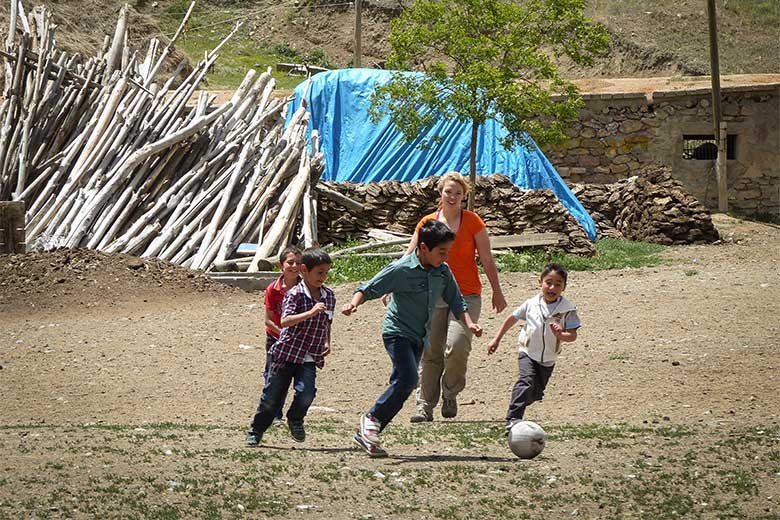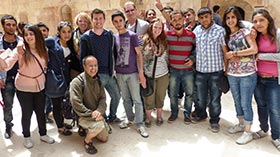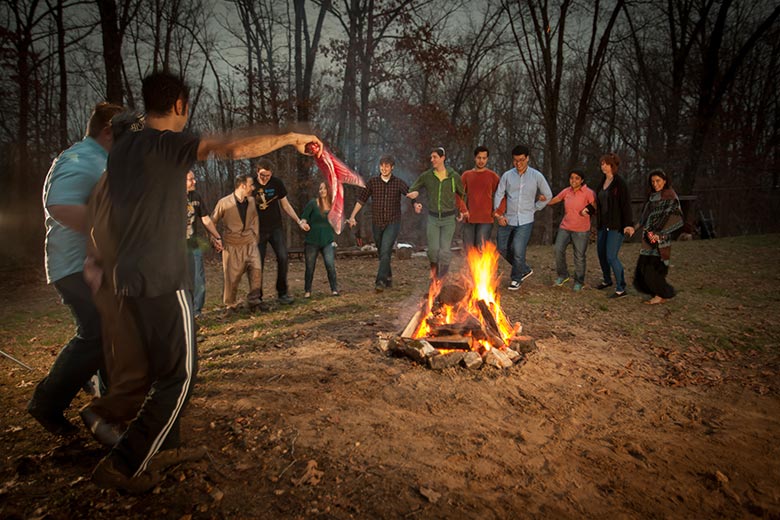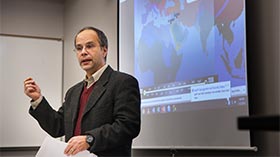The big questions: Life and death in the Middle East
The opportunity to examine such questions drew his attention to the Middle East and ultimately to Kurdish communities in the region.
Romano, who holds the Thomas G. Strong Chair for Middle Eastern Studies in the political science department, has written two books tackling life-and-death questions that affect Kurds in Iraq, Iran, Syria and Turkey. He also dissects everything from Iranian nuclear negotiations to American influence on the Iraqi constitution in his column for the Kurdish newspaper “Rudaw.”
“It doesn’t even occur to me not to be impassioned about it.…I may have met the people in question.” — Dr. David Romano
When asked how he musters fresh concern for a region whose complexity and violence drive many to bitter resignation, Romano said, “It doesn’t even occur to me not to be impassioned about it.” On reading about 200 Assyrians captured by the Islamic State, he reflected, “Their village is on the banks of the Khabur River. I’ve swum in that river. I know exactly where it is. I may have met the people in question.”

Interrupting radicalization
Romano’s tactile understanding of the Middle East and network of connections – both products of his extensive travel – are great assets to his current research, a global comparison of the factors that contribute to extremism.
The cross-case study of radical groups in Europe, Latin America and Asia seeks answers to one of today’s most anxiety-inducing questions: Why would someone be willing to take up arms for a cause?
 “In the research, that person could be anyone,” Romano said, “depending on the context and the socialization that occurs.” However, he noted, “I don’t subscribe to this idea that one man’s terrorist is another’s freedom fighter.” Accordingly, the study focuses on groups that use radical tactics rather than assessing whether their goals are radical.
“In the research, that person could be anyone,” Romano said, “depending on the context and the socialization that occurs.” However, he noted, “I don’t subscribe to this idea that one man’s terrorist is another’s freedom fighter.” Accordingly, the study focuses on groups that use radical tactics rather than assessing whether their goals are radical.
“For the purposes of this analysis, it’s the means they are willing to resort to that define whether someone’s a terrorist. Someone struggling for a clean environment for poor people will be a terrorist if they set bombs against civilians in order to accomplish it. ”
Over the course of the project, an international team of collaborators will examine some of radicalism’s most commonly cited factors, including the insertion of religious interpretations into politics, a lack of democracy, a history of colonialism and extreme poverty.
Across radical groups, youth appears to offer a critical window. “That’s when people become politically aware,” Romano said. In addition, young people are strongly influenced by peer groups, and the rise of social media has created new platforms for dangerous ideologies. According to Romano, “We’re seeing this remarkable phenomenon of the Islamic State recruiting people via Facebook.”

Engaging students at Missouri State
Yet while youth can make someone vulnerable to destructive ideas, it also marks a time of openness and growth. Romano’s scholarship has roots in his own undergraduate days, when he tagged along on a friend’s trip to Turkey. There – in the midst of a Kurdish insurgency – he found that “half the people were telling me Kurds didn’t exist in the country, and others were telling me they were fighting for their rights. Others said they were terrorists. I got really curious as to what the situation was.” A lack of Western scholarship on the issue prompted his first investigation into Kurdish identity, ideals and culture.
“Engaging students to approach issues objectively and ethically goes a long way toward fulfilling the public affairs mission [of Missouri State].” — Dr. David Romano
 Now, Romano provides similarly enriching experiences for his students, including study abroad courses and multicultural interactions – such as a celebration of the Kurdish holiday Newroz that he hosts each spring.
Now, Romano provides similarly enriching experiences for his students, including study abroad courses and multicultural interactions – such as a celebration of the Kurdish holiday Newroz that he hosts each spring.
“Engaging students to approach issues objectively and ethically goes a long way toward fulfilling the public affairs mission [of Missouri State],” he said. “When they walk out of here, they may not remember the details of dates or events, but hopefully I’ve instilled in them a way of approaching these questions… to make them better citizens. So that if someone from another ethnic or religious group moves next door to them, they will have the curiosity and background knowledge to understand them, which makes for a better society.”


I have been absent for a while, but now I remember why I used to love this site. Thanks , I¡¦ll try and check back more often. How frequently you update your site?
Well I really liked reading it. This information procured by you is very helpful for correct planning.
I do agree with all the ideas you have introduced on your post. They’re really convincing and can definitely work. Nonetheless, the posts are very short for beginners. May you please extend them a little from subsequent time? Thank you for the post.
My husband and i have been now excited that John could finish off his research because of the precious recommendations he had out of your web pages. It is now and again perplexing to simply always be giving for free hints which usually most people have been trying to sell. We keep in mind we now have the writer to give thanks to because of that. All of the illustrations you’ve made, the easy site menu, the friendships you will assist to foster – it’s most astounding, and it’s really facilitating our son and us believe that the article is enjoyable, and that’s tremendously pressing. Thanks for the whole thing!